May 14, 2025 | 08:51 GMT +7
May 14, 2025 | 08:51 GMT +7
Hotline: 0913.378.918
May 14, 2025 | 08:51 GMT +7
Hotline: 0913.378.918
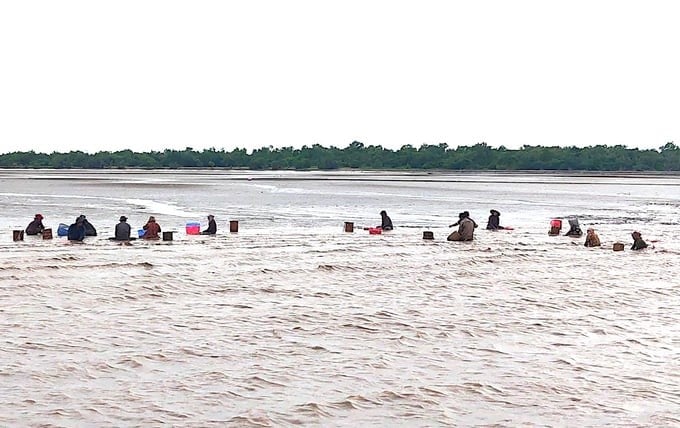
Clam exploitation in Thanh Phu district, Ben Tre province. Photo: Minh Dam.
According to Mr. Huynh Van Cung, Director of the Ben Tre Sub-Department of Fisheries, since 2009, Ben Tre clam has been certified by the Marine Stewardship Council (MSC) as meeting MSC standards for the 2010–2015 period and then continued to be recognized and maintained for the second time in 2015–2020. Up to now, the clam management and exploitation profession has continued to be recognized with MSC standards for the third time in the 2024–2029 period (valid from May 23, 2025, until March 22, 2029).
The third recertification for the province's clam profession is also the result of the efforts of cooperatives, fishing communities in the three coastal districts, and relevant departments, branches, and units. This is an honor and pride for the clams of Ben Tre in particular and Vietnam in general in the international market. Clam is currently making a positive and important contribution to the province's export proportion of goods. Particularly, meat clam is highly appreciated for its nutritional value, food safety, and hygiene. Currently, clams originating from Ben Tre are reputable and dominate many markets in Europe and Asia.
Mr. Dinh Xuan Lap, Deputy Director of ICAFIS, Vietnam Fisheries Association, shared that MSC is the highest and most difficult certification in the fisheries industry, recognized by the world community. "MSC is a'super VIP' visa for clams to enter the international market with over 100 countries," emphasized Mr. Dinh Xuan Lap.
Ben Tre's annual output of MSC-certified clams reaches an average of 7,500–8,000 tons, with an estimated value of about VND 200–250 billion (1 USD = 25,500 VND). Thereby, contributing to creating jobs, increasing income, and improving the lives of 20,000 members of 7 cooperatives and thousands of local workers, especially women in rural areas.
According to the Binh Dai District People's Committee, the district's area of mollusk farming is now more than 3,150 hectares. In the past 6 months, exploitation output reached about 10,680 tons. Of which, the commercial clam exploitation output at two seafood cooperatives, Dong Tam (Thua Duc commune) and Rang Dong (Thoi Thuan commune), reached more than 2,400 tons, achieving a revenue of over VND 59 billion.
In the first months of this year, although clams died due to highly increased salinity and temperature, thanks to the effective application of response measures, output was favorable, with prices of around VND 30,000/kg. Thus, thousands of fishermen still had a stable income. Both Dong Tam and Rang Dong Cooperatives maintain monthly salary payments to cooperative members; the security and order situation on the clam grounds is stable, which has prevented clam bandits.
Mr. Vo Van Quan, Vice Chairman of the Binh Dai District People's Committee, shared that, in general, members of the two clam farming cooperatives have a stable life. In addition to receiving money from the profits, each time they exploit, people also alternately participate in raking clams and are paid additional wages based on output, which is more than the "dividend" payment.
The profession of managing and exploiting Ben Tre clams according to MSC standards is not only economically valuable but also brings many positive aspects in terms of resource protection, reasonable exploitation, ensuring conservation and biodiversity, ensuring sustainable development, and stabilizing the coastal intertidal ecosystem. At the same time, the spirit of protecting rare animals if they appear on clam grounds is raised, and the management system is increasingly improved and perfected.
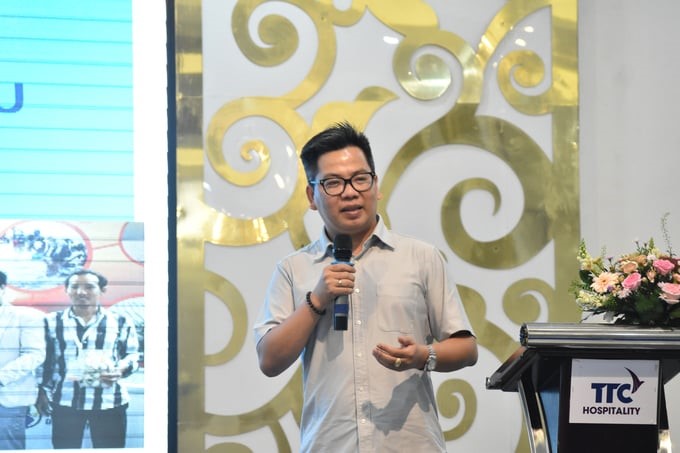
Mr. Dinh Xuan Lap, Deputy Director of ICAFIS, shared that MSC is the highest and most difficult certification in the fisheries industry, recognized by the world community. Photo: Minh Dam.
Regarding solutions to maintain MSC certification for the clam profession in the coming time, Dr. Nguyen Thanh Tung, Director of the Research Institute for Aquaculture No. 2 (Ministry of Agriculture and Rural Development), said that three principles need to be implemented. Those are: clam exploitation does not cause overexploitation or depletion of other target populations; ensuring the maintenance of ecosystem structure, production capacity, function, and diversity; and an effective management system complying with the law.
"As for the first principle, it is necessary to regulate sustainable exploitation and protection of aquatic resources, ensuring 10–15% of commercial clams for restocking. Clam seeds can only be exploited when they reach size and must be approved by the local management or cooperative to exploit them. Use eco-friendly exploitation tools that do not cause destruction or impact on the ecosystem. The exploitation process must be kept in a logbook and fully archived," said Dr. Nguyen Thanh Tung.
Determining that clam is the province's key farming object, the agriculture and rural development sector has implemented many sustainable management and exploitation solutions, such as planning areas for raising meat clams, clam seeds, and clam broodstock.
At the same time, coordinate with institutes, schools, ICAFIS, and the Ben Tre Fisheries Association to implement research topics on mollusks and investigate species composition reserves on clam grounds. Besides, direct specialized units to regularly observe the environment, proactively monitor diseases in clams, promptly recommend when there is hot sun or heavy rain, and trace the origin when harvesting.
Mr. Nguyen Van Buoi, Deputy Director of the Ben Tre Department of Agriculture and Rural Development, shared: To continue to maintain, develop, and exploit clams sustainably according to MSC standards, it is the responsibility of state management agencies, especially the Department of Agriculture and Rural Development, to support cooperatives and people's communities.
Accordingly, the sector will guide the serious implementation of the three sets of principles of the MSC standard to carry out annual maintenance assessments as required by the unit.
Preserve the clam broodstock resources; plan reasonable exploitation; and well protect the existing natural clam seed resources. Conduct an annual survey of the output and species composition of clam grounds to serve as a database for assessment. Form and promote horizontal and vertical linkages to develop the MSC brand for Ben Tre Clam in the domestic and international markets.
"To achieve the above-mentioned tasks requires close coordination from all levels and branches of the province and support from institutes, schools, and centers to jointly support cooperatives and coastal fishing communities," affirmed Mr. Nguyen Van Buoi, Deputy Director of the Ben Tre Department of Agriculture and Rural Development.
Translated by Thu Huyen

(VAN) Use of high-quality broodstock and biotechnology is regarded as the most effective approach to ensuring sustainable and economically viable shrimp aquaculture ahead of climate change and the emergence of increasingly intricate disease patterns.

(VAN) Carbon farming is a form of agricultural practices that helps absorb more greenhouse gases than it emits, through smart management of soil, crops, and livestock.

(VAN) This is a key content of the Memorandum of Understanding recently signed between the Vietnam Fisheries Society and Kunihiro Inc of Japan.

(VAN) To achieve the goal, local authorities and businesses in Kon Tum province have fully prepared the necessary conditions for the new Ngoc Linh ginseng planting season.
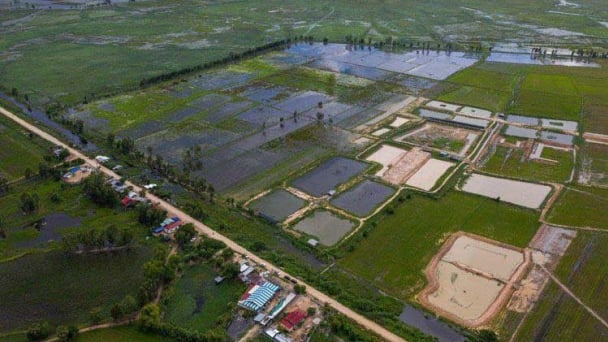
(VAN) Jiangsu province is gearing up to host training programs in Phnom Penh, the capital of Cambodia, this year to establish the Fish and Rice Corridor.
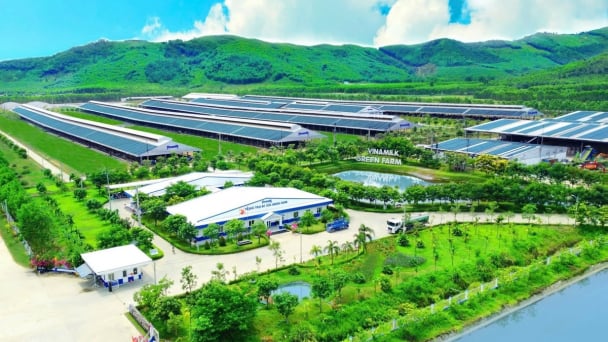
(VAN) Le Hoang Minh, representing Vinamilk, shared the company's experience in energy saving and green energy transition for production at a workshop held during the P4G Summit.
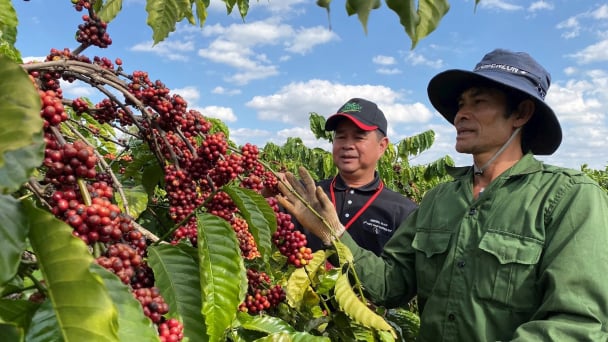
(VAN) Businesses emphasize fairness and equality when integrating social factors into their sustainable development strategies.